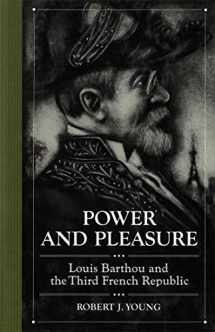
Power and Pleasure: Louis Barthou and the Third French Republic
Book details
Summary
Description
Neither Barthou's contemporaries nor subsequent historians have known quite what to make of this bourgeois politician who fought a duel with Jean Jaurès and flew with Wilbur Wright. Many concluded he was an individual of considerable talent, few principles, and excessive ambition. No one, reading Power and Pleasure, can maintain that view. Robert Young, constructing a complete picture of Barthou, effectively refutes the charge of unprincipled ambition and deftly deals with the tension between political principles and pragmatism. Young has written a social biography, situating Barthou's life -- both public and private -- in the political and cultural context of the Third Republic. Barthou was a centrist in his politics and, while current scholarship maintains that centrists adopted regressive strategies in response to the social question, Young presents an alternative reading of their position. He argues that although centrists like Barthou were not socialists -- for them "bourgeois" was a positive term -- they were capable of adjusting their ideals to meet the social changes of modern France. Barthou's turbulent political career was tempered both by a thirty-five-year marriage to his supportive wife and by a lifetime of pleasure derived from music, art, history, books, and literature.


We would LOVE it if you could help us and other readers by reviewing the book
Book review



